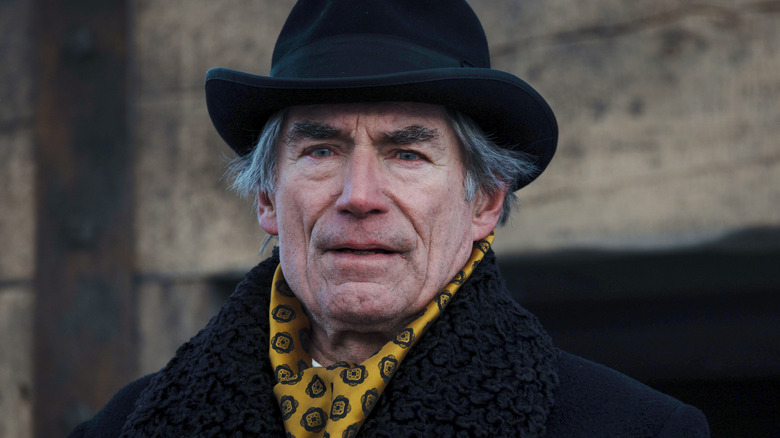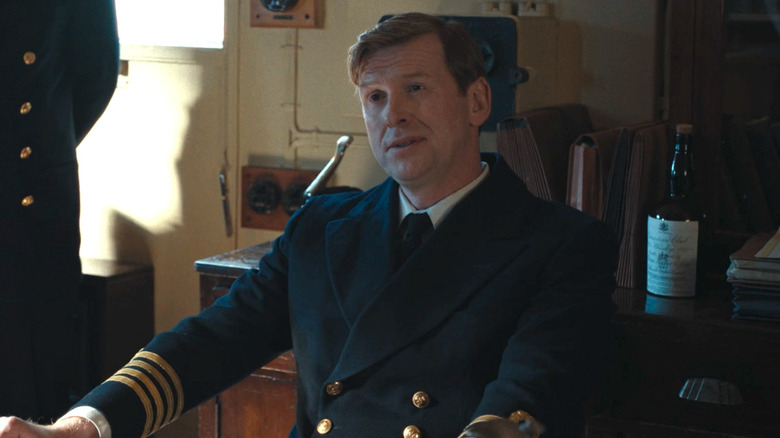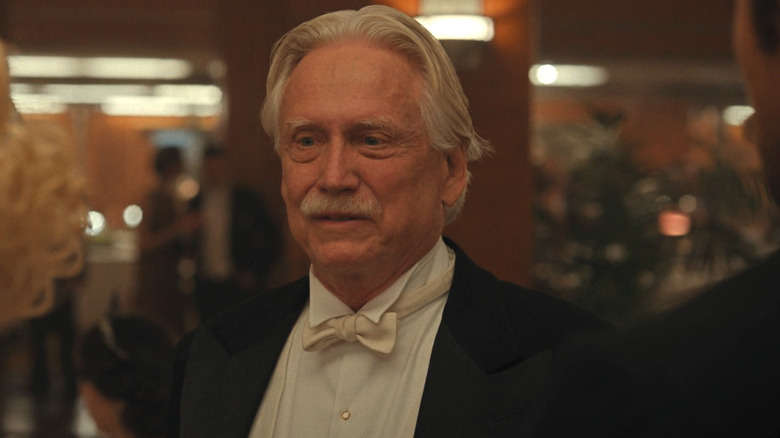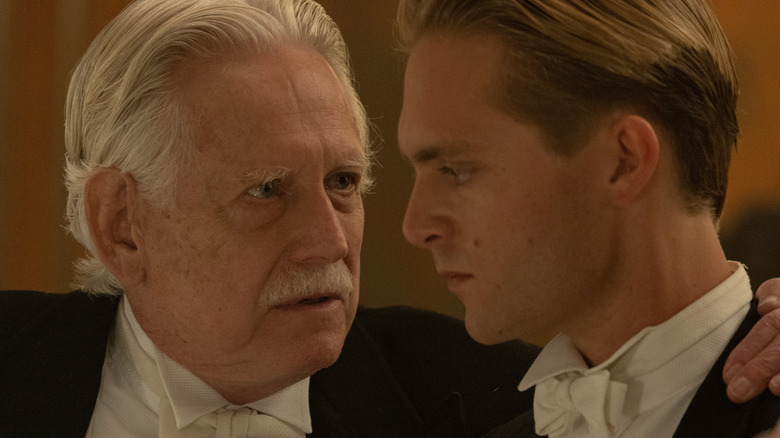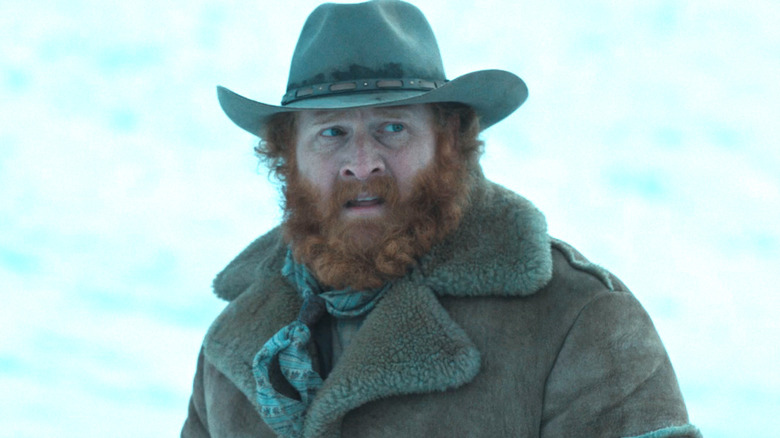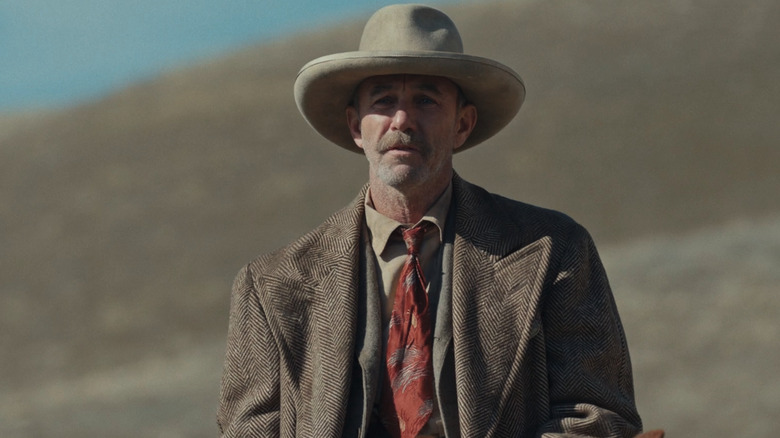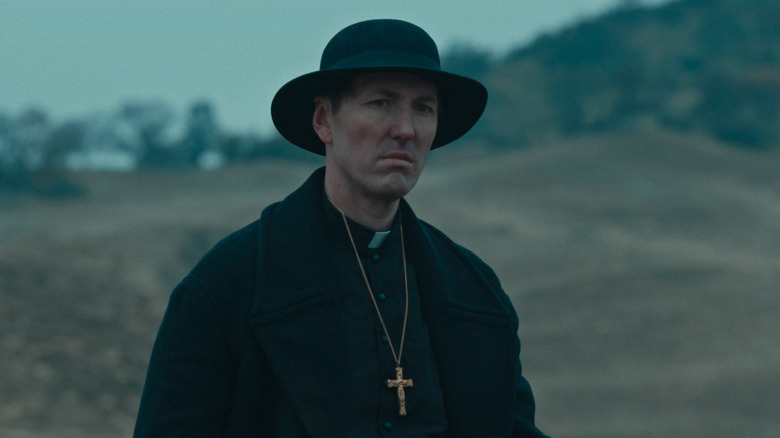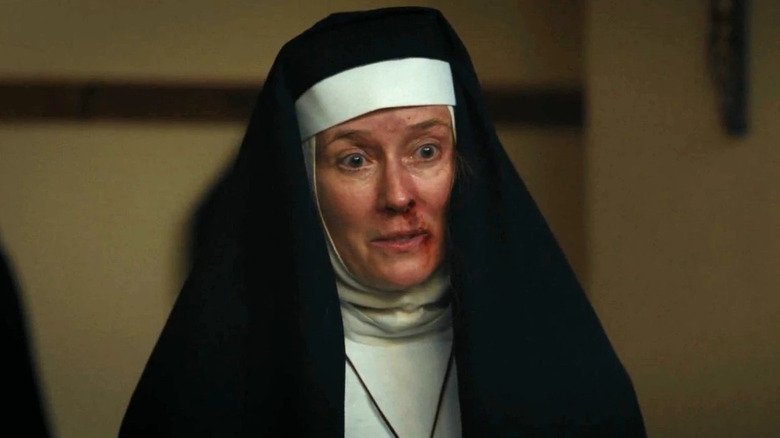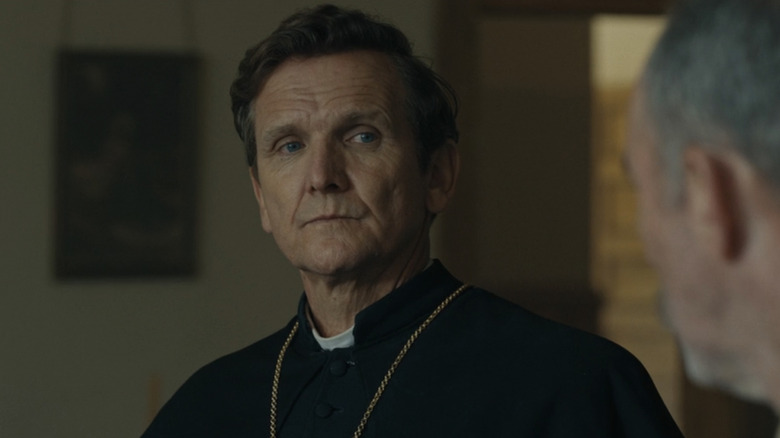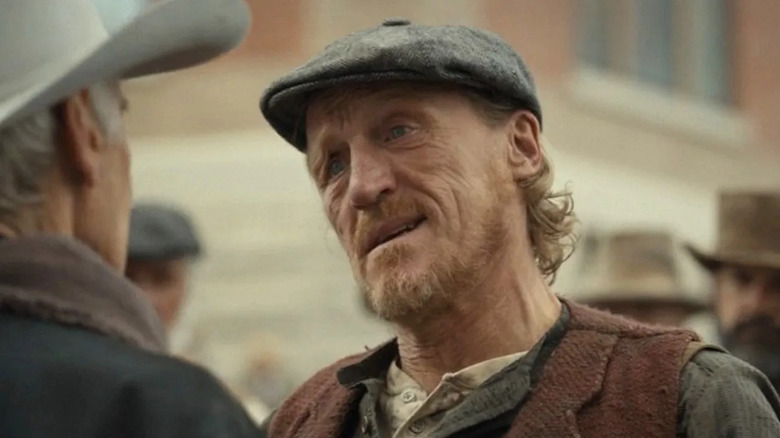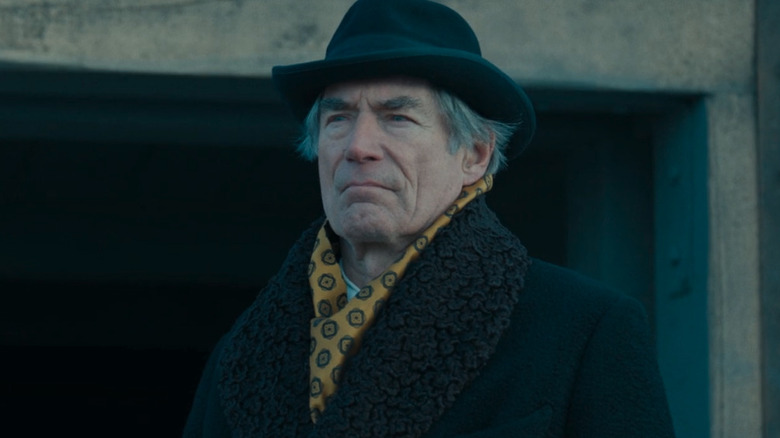Every 1923 Season 1 Villain Ranked From Bad To Worst
Every story needs a good villain, and when it comes to Taylor Sheridan's "Yellowstone" universe, we've got plenty to choose from. John Dutton has to deal with his own sinister adversaries in the 21st century on "Yellowstone," psychotic businessmen like Malcolm and Teal Beck standing out as particularly vivid examples. His ancestor James fights off attacks from deadly Lakota warriors in "1883." But the Harrison Ford-led spin-off "1923" has arguably the best roster of baddies we've seen yet — which is pretty impressive for a series that currently spans just eight installments. On this show, Jacob Dutton and his kin contend with new breeds of villain. From bitter ranchers and power-mad magnates to vengeful ex-lovers, "1923" has produced an impressive cast of characters out to wreak havoc on the family's legacy.
But the Duttons of Montana aren't the only ones facing down bitter enemies on "1923." Young Native American woman Teonna Rainwater faces threats from malicious religious leaders and dastardly headhunters. Some of these villains are simply cruel and uncaring, while others are vicious, deadly, and purposeful killers. The worst of all are men and women driven by a lust for power and dominance. They don't care what gets in their way — they'll do anything, destroy everything, and kill whoever they need to, if that's what it takes to end up on top. Let's take a look at how they stack up, as we rank the villains of "1923" from bad to worst.
Captain Hurley
Admittedly it might be something of a stretch to call Captain Hurley (Damian O'Hare) one of the villains of "1923." But as the man who throws Spencer Dutton off the RMS Majestic in the Season 1 finale "Nothing Left to Lose," he's definitely in opposition to our heroes. He's also one of the few antagonists whose actions have serious consequences, which stand to be felt well into Season 2 of the series.
A captain in the English luxury liner fleet, he's first seen when Spencer Dutton accepts the challenge of a duel, offered by Arthur, his wife Alex's ex-fiancé. At the news that there will be a fight on the deck of his ship, Captain Hurley rushes to alert the first mate. Spencer roundly rousts the young Englishman, and is forced to hurl Arthur overboard in a desperate attempt to save himself from a yellow-bellied move. Hurley takes action. Charging Spencer with engaging in an illegal duel, the captain throws the American into the brig. At the behest of Arthur's father, a prince in the royal line of succession, he also has Alex imprisoned. Callously ignoring the words of bystanders who attest that Spencer only acted in self-defense, Hurley has Spencer removed from the vessel and separated from his wife. While not quite evil, Hurley's unfortunate deferrence to the prince shows a lack of good character at the very least, and a cruel indifference to justice at the worst.
Arthur Sr.
Glimpsed briefly early in the season, Arthur Sr. (Bruce Davison) may actually be based on a real person: Prince Arthur William Albert, Duke of Connaught and Strathearn. In the season finale, Arthur Sr. sails aboard the RMS Majestic, where he accompanies a royal party that also includes his son Arthur Jr., and said son's former fiancé, Alex — now the wife of Spencer Dutton. At first, Arthur Sr. seeks to comfort his son by telling him that Alex's leaving is a blessing in disguise. Had she not departed his side, he would have been married to someone who didn't love him. He even encourages his son to ignore Dutton and his new bride entirely.
When Arthur Jr. fails to control his bitter resentment towards Spencer, however, ultimately challenging the famed African big game hunter to a duel, Arthur Sr. is angered. He's not just upset with his son for his recklessness, but also with Alex, for (as he sees it) disgracing both their families. Despite the fact that Spencer shows mercy on his son, the duel goes sideways. Arthur Sr. is beside himself with a mixture of anger and grief when Arthur Jr. is thrown overboard after pulling a pistol.
No longer just a bitter father, Arthur Sr. is now a royal menace. He orders the ship's captain to have Alex locked in her cabin until they return to London, separating her from Spencer, whom he wants removed from the ship. Unwilling to show mercy in light of his son's behavior, the prince rips Spencer and Alex apart in a cruel effort to find what he thinks is justice.
Arthur Jr.
Of course, while Prince Arthur Sr., the Earl of Sussex, may be a nasty sort, he doesn't quite reach the depths of villainy his son, (Rafe Soule) Arthur Jr., achieves. The younger royal might also have been inspired by a real person: Alastair Arthur Windsor, 2nd Duke of Connaught and Strathearn. In any case, he's introduced in an early episode as an uptight Englishman who's due to be wed to charming Londoner Alexandra, who we learn has a greater taste for adventure than for the quiet life of a royal lady.
When his bride-to-be abandons him for big game hunter and famed World War I American hero Spencer Dutton, Arthur is maddened with the fury of a jilted lover. Though Alex tells him to find someone who truly loves him, this does little to console him. When he turns up again, he's ready to express that rage at Alex's newfound husband, Spencer.
Aboard the RMS Titanic, Arthur repeatedly attempts to offend Spencer, who warns him that he does not want to pick a fight with a man who kills for a living. But Arthur will not be satisfied by reason, and after a public display in a ballroom, he challenges Spencer to a duel. Despite being an expert fencer, Arthur is left bloodied and humiliated. But that isn't enough to keep him from making a stupid decision. Arthur decides to go further, abandoning the honor of the duel entirely when he picks up a pistol to gun Spencer down. Ultimately, Arthur gets what's coming to him: Spencer tosses him overboard, to a watery death. But he doesn't manage to shuffle off this mortal coil without revealing what a vile villain he really is.
Clyde
Not all villains on the range are deadly outlaws and killers — some are the conniving kind. Season 1 of "1923" gives us a few such baddies, the first being red-bearded lawman Clyde (Brian Konowal). He's brought on by Sheriff McDowell amid an effort to grant the livestock agency authority to make arrests, in the wake of the attack on the Duttons. Clyde claims to be a former Chicago peace officer, but what the Dutton's don't know is that Clyde is secretly in the employ of their greatest enemy, mining magnate Donald Whitfield.
His first act of betrayal comes when the newly formed group of officers, led by McDowell, arrest Banner Creighton for the attack on Jacob Dutton. He slyly sends word of the arrest to Whitfield, who vows revenge, and immediately sets out to get Banner released from custody. But his most despicable act comes in the Season 1 finale, when he shows not just duplicity, but a chilling cold-bloodedness. Clyde follows Dutton ranch leader Zane to his home and discovers his wife is a Chinese immigrant. In a cruel act of inhumanity, Clyde sends word to the authorities. Police officers come to Zane's home the next day. There, they beat Zane bloody and arrest his wife for miscegenation, the now-outdated "crime" of marriage between people from different racial groups. Though he has yet to take up arms directly against the Duttons, Clyde may be just as dangerous as any gun-toting gangster.
Marshal Kent
Traditionally, the U.S. Marshal is one of the most noble, tried-and-true lawgivers in any Western. They take on the role of hero, hunting down outlaws and fugitives: Consider John Wayne in the 1973 film "Cahill U.S. Marshal," or his performance as Rooster Cogburn in "True Grit" a few years earlier. But in "1923," U.S. Marshal Kent (Jamie McShane) is not the kind of do-gooding lawman John Wayne played. Instead, he's one of the show's most contemptible villains, a heartless man with a badge who uses his power to persecute the Native American populace of the reservation.
The story of a young Native American girl named Teonna weaves throughout Season 1. Tortured and terrified, Teonna is forced to kill to escape her abusers. When Marshal Kent attempts to apprehend her, he isn't exactly gentle about it. On his first stop in search of the escaped youngster, Kent travels to Teonna's grandmother's home. He accidentally kills her when he forcefully shoves her aside, knocking her head into an iron stove. Though he doesn't intend to kill, his cold disregard is evident when he suggests to his deputy that her death is no concern.
Introduced just when Teonna's story seems to be taking a positive turn, Kent's presence raises the stakes and brings ruthless pursuit into the mix. He doesn't even respect the Catholic priests of her school, and outright dismisses their religious rites. The only thing that's on his mind is capturing and killing a teenaged girl.
The clergymen
If there's one thing plainly evident in "1923," it's that the men and women of the Catholic church active on the reservation are not the righteous servants of God they claim to be. From the top down, they seem far less interested in performing the will of the Lord as spoken in the Holy Bible than they are in exerting control over the Native American children of the school. Intent on stripping them of their culture, heritage, and very identities, they're unendingly intent on meting out punishment for even the most innocent transgressions.
When Teonna defies the school and murders Sister Mary, the representatives of the church are enraged. To find her, Father Renaud sends out three clergymen on horseback. They will stop at nothing on their quest to find their lost sheep, return her to the flock, and extract penance for her misdeeds. This is brutal enough, but what makes them even worse is that they do more than just seek out Teonna. When they come upon the teenaged Peter, a Native American kid who does not attend the school, they violently take him into their custody and drag him off by force.
Later, when they manage to locate Teonna, they engage in a deadly fight that forces the girl to gouge one of their eyes out. Unable to stand such insolence, they're ready to kill her, but are stopped by gunfire from Hank, the man who rescued Teonna on the plains. Sadly, they wind up murdering him as well.
Sister Mary
In pop culture, there has long been a stereotype of the cruel Catholic school nun. The image of a stern, scowling sister is at its most extreme in movies like "The Magdalene Sisters" and horror films like "The Nun." But what makes Sister Mary (Jennifer Ehle) so disturbing is that she's not portrayed as being a horrific monster or an exaggerated, supernatural evil. She is, instead, a symbol of the real-life atrocities that occurred in Catholic boarding schools on early American reservations.
Sister Mary is the first villain we meet. A cruel and unflinching disciplinarian, she has no patience for her Native American students and no mercy for those who don't meet her expectations. She seems to delight in their suffering and to enjoy tormenting them, whether she's striking them for the use of their native tongue or antagonizing them when they're struggling. The suffering she inflicts is not for those with uneasy stomachs. These hideous actions leave her charges permanently scarred, both physically and psychologically.
Ultimately, Sister Mary pushes her abuse so far that young Teonna has little choice but to fight back. Sister Mary meets her end when Teonna beats her with a sack of books and suffocates her with an old rag. It's a rare case of justice clearly being done on "1923," as the barbarous Sister Mary gets what she deserves.
Father Renaud
In truth, we could have ranked Sister Mary higher — it's just that tough to decide whether she or Father Renaud (Sebastian Roché) is more vile and cruel. But Renaud's more senior position at the Catholic boarding school seems as good a line of demarcation as any, so he gets the dubious honor of the higher spot on this list.
As the man in charge, Renaud is one of the most chilling villains on "1923" — not merely because of his inhuman actions, but because of his icy exterior. No matter how much pain and suffering he inflicts, he rarely expresses so much as a single flinch of emotion. Where some villains on the series take a perverse pleasure in the suffering of others, we get the sense that Renaud may derive neither satisfaction nor shame from the pain he subjects others to. As a faithful instrument of the Lord, he seems to believe it is simply his place on this Earth to punish sinners and force penance on those who have forsaken His word.
What might be even worse is that he truly believes himself to be the righteous moral authority on this mortal plane. He punishes Sister Mary as much as he does Teonna. He tortures malcontents at his school. He is entirely unconcerned that so many Native American children have died at his hands that it necessitates an entire graveyard — a fact that seems to unnerve even Marshal Kent. A truly diabolical antagonist, Father Renaud's very presence on screen is often enough to unsettle.
Banner Creighton
While villains like Sister Mary and Father Renaud are perhaps the most sinister on "1923," rival rancher and Irish sheepherder Banner Creighton (Jerome Flynn) tops them with sheer savagery and blood-thirsty viciousness. When we first meet him, Banner seems like little more than a disgruntled landowner, or at worst a petty thug. But soon, we learn how menacing he truly is.
Banner defies Dutton's warnings, sparking a violent standoff that quickly leads to bloodshed. When Dutton punishes Banner and his gang for trespassing on his land, the Irishman retaliates with violent fury, leading his men on an assault not just on his nemesis, but on the entire Dutton family. He and his men gun down the Duttons in a ferocious assault, filling several members of the clan with hot lead. Banner leads the charge himself, wielding a rapid-fire Tommy gun that kills John and seriously wounds Jacob.
An unflinching, cold-blooded killer, Banner is willing to do whatever it takes to see vengeance done against the Duttons and take their ranch. He's set on this goal, even if he has to murder every last one of them to accomplish it. Uncontrollable as a violent force of nature, Banner is driven by rage, and Heaven help any man who stands in his way. In fact, the only thing that helps Banner avoid the top spot on our list is that he's not quite as cold and calculating as the man who occupies it.
Donald Whitfield
When it comes to sheer villainy, Donald Whitfield sits atop the heap on "1923." As close to pure evil as they come in the "Yellowstone" universe, Whitfield — played by former James Bond Timothy Dalton — is the classic arch-villain. He's greedy, selfish, and hungry for power. Whitfield doesn't care who gets in his way or how much he has to hurt them to get what he wants — he's getting what he wants, period. A classic schemer, his danger comes from the fact that he never acts without thinking. Every single move Whitfield makes is a deliberate strike.
As a wealthy tycoon and shrewd businessman, Whitfield has orchestrated attacks on the Duttons that require no violence — though he's certainly not above bloodshed if it's required. He has manipulated situations with downright Machiavellian skill, but he's more than just a mustache-twirling villain. Beneath his cool and cunning exterior lies a sadistic madman who takes dark pleasure in other people's pain and anguish.
Though his plot to usurp the Yellowstone Ranch from the Duttons has borne little fruit as of the end of Season 1, it's clear that he's putting the pieces in place like a chess Grandmaster. When the time is right, he'll make his move. And if the Duttons don't have their own strategy at the ready, they may just wind up on the losing end of Whitfield's twisted game.
